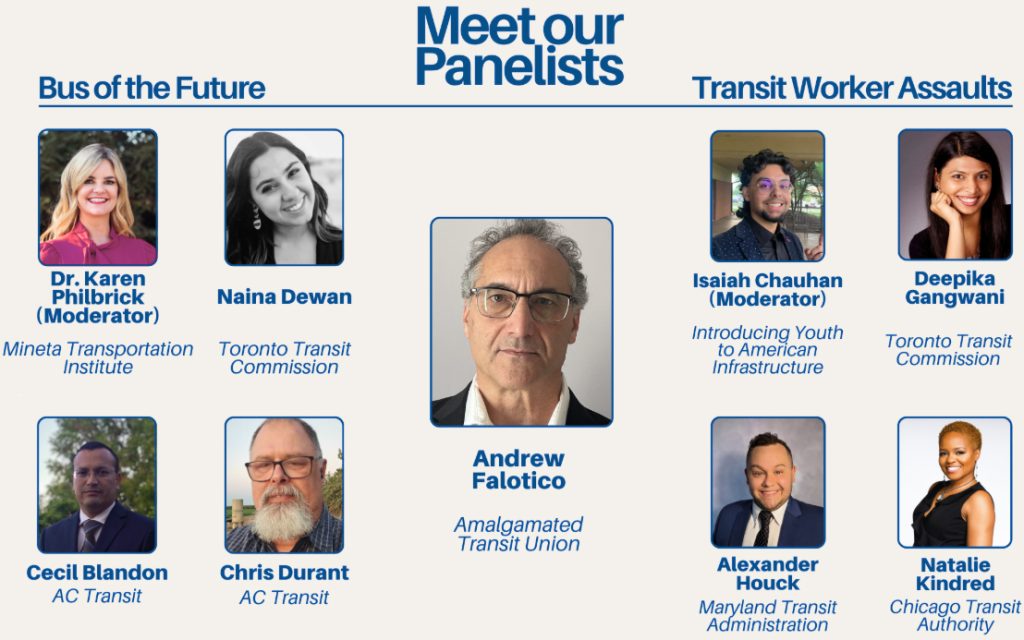Creating a Full Shield of Transit Worker Safety
6/12/2025

Public transit workers keep our communities moving, but too often their safety is at risk. In iyai+’s (Introducing Youth to American Infrastructure) 2025 Critical Conversations webinar series, “Stop Transit Worker Assaults,” a discussion ensued on elevating national dialogue, policy reform, and the role of youth leadership in confronting one of the most urgent issues facing public transportation. This session brought together transportation professionals, union leaders, agency innovators, and a national youth audience for a deeply relevant and solution-oriented conversation.
Dr. Beverly Scott opened the session with a powerful message: tackling industry-wide challenges like transit worker assaults demands both a strategic response and a youth-centered perspective. She credited a wide network of program sponsors, including APTA, the Amalgamated Transit Union (ATU), the Toronto Transit Commission (TTC), and Alameda-Contra Costa Transit District (AC Transit), as essential partners in building platforms where young leaders could contribute to real solutions.
The conversation was framed by two members of APTA’s 2025 Emerging Leaders Program: Deepika Gangwani from TTC and Alexander Houck, deputy chief of safety at Maryland Transit Administration (MTA). Both brought current, hands-on experience managing frontline safety challenges, and both modeled the kind of leadership the transit sector urgently needs. Andrew Falotico, ATU health and safety director, set the stage explaining the state of transit worker safety today and how the implementation of full windowed shields is essential to ensure driver protection.

Gangwani, also an Auxiliary Police Constable, shared how her experience working with both TTC and the Toronto Police Service (TPS) enabled her to shape multilingual public safety campaigns, manage real-time transit incidents, and advocate for inclusive rider engagement. She shared valuable insight on the partnership that TTC and TPS has formed alongside the positive results that have come from it.
Alexander Houck highlighted Maryland’s legislative response to the rise in assaults, detailing how MTA is creating a Rider Code of Conduct and developing rider exclusion policies for those who attack transit workers. What made this particularly innovative: youth were directly involved. MTA’s Youth Transit Council actively shaped these policies, proving that meaningful youth engagement is not symbolic, it is structural.
The message was reinforced that addressing violence against transit workers must go beyond stricter laws, equipment, and surveillance. Solutions must include a cultural shift in one that promotes respect, accountability, and awareness among all riders.
The panelists discussed how agencies can:
- Provide trauma-informed training for frontline employees.
- Establish clear community accountability mechanisms.
- Launch educational campaigns co-led by youth.
- Improve reporting systems to encourage operator feedback.
The message was clear; public transit does not just need shields on buses. It needs full shields in its systems: systems of respect, systems of equity, and systems of response.
Throughout the session, one idea echoed: young people are not just the next generation of riders, they are today’s cultural influencers. Whether it is advocating for better signage, reporting unsafe behavior, shaping social media messaging, or leading peer-to-peer education, youth have tools and voices that are uniquely powerful.
This session did not mark the end of the conversation; it extended an invitation—for riders, agencies, unions, and young leaders to come together, not just to talk, but to act. Iyai+ is gathering input on how to make public transit safer, more innovative, and responsive to community needs. Your voice matters! Please take a few minutes to complete its 2025 Transit Safety & Innovation Survey and share it with others who care about better public transportation: www.surveymonkey.com/r/V5H9J5K.